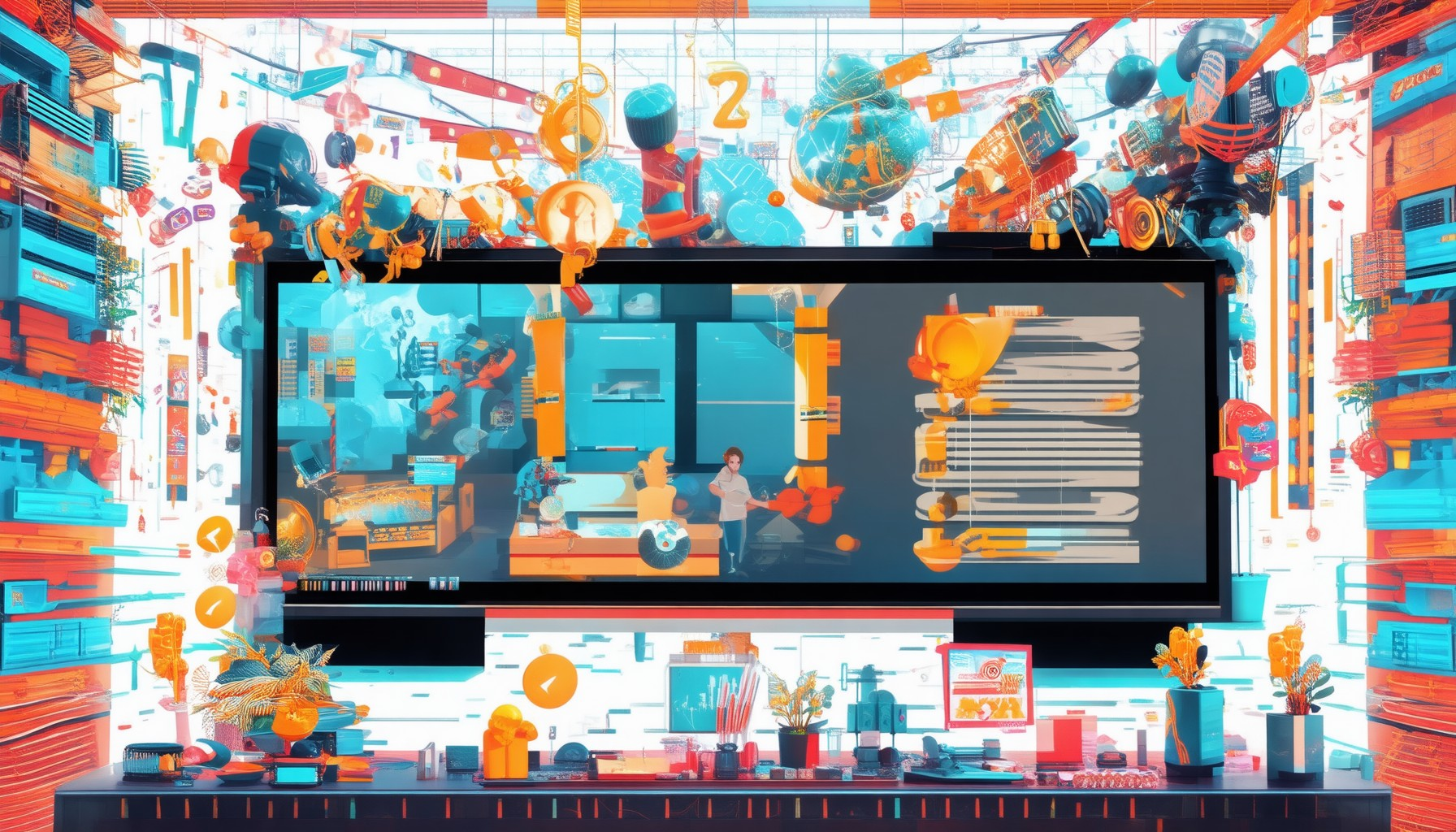The entertainment landscape is constantly evolving, driven by technological advancements and shifting consumer preferences. As we step into 2023, the world of entertainment is brimming with fresh innovations, blending tradition with cutting-edge experiences. From the rise of interactive media to the dominance of streaming platforms, the industry is redefining how people consume content. This year, the focus is not just on entertaining but also on profitability, as companies seek new ways to engage audiences and monetize their offerings. Whether it’s the surge of entertainment apps or the growing popularity of live events, the entertainment sector is adapting to meet the demands of a globalized audience. Join us as we explore the latest trends shaping the entertainment world, from the most popular forms of entertainment to the industries poised to dominate the market in the coming years.
Key Takeaways
- Gaming is revolutionizing entertainment with cloud gaming services like Xbox Cloud Gaming and Google Stadia, offering universal access to high-quality experiences.
- Streaming Platforms are dominating the scene, investing in original content and using AI to curate personalized experiences, driving subscriber growth.
- Esports has surged in popularity, with massive audiences watching live tournaments on platforms like Twitch and YouTube Gaming, supported by hefty brand sponsorships.
- Virtual Reality (VR) and Augmented Reality (AR) are transforming entertainment with immersive experiences, poised to become mainstream as accessibility improves.
- Social Media continues to shape culture through short-form videos and interactive challenges on platforms like TikTok and YouTube.
- The Film and Media Industry stands as the most profitable, leveraging box office, streaming, and licensing for sustained revenue.
- Gaming Industry Profits soar from live-streaming, esports, and in-game purchases, with platforms like Twitch and Fortnite generating billions annually.
- Music and Live Events rebound post-pandemic, boosting artist earnings through ticket sales and merchandise, led by stars like Taylor Swift and Drake.
- Sports Betting and Fantasy Sports are booming, especially in North America, integrating with traditional sports leagues for enhanced profitability.
- Broader trends in Technology, Renewable Energy, Healthcare Technology, and Emerging Markets are reshaping the global entertainment landscape, driving future innovations and growth opportunities.

The Next Big Thing in Entertainment
The entertainment industry is constantly evolving, driven by technological advancements, shifting consumer preferences, and creative innovations. Here are some emerging trends and technologies that are poised to shape the future of entertainment:
- Virtual Reality (VR) and Augmented Reality (AR)
- VR and AR are transforming the way we experience entertainment. From immersive gaming experiences to virtual concerts and movie screenings, these technologies are creating new dimensions of engagement. Platforms like Oculus and PlayStation are leading the charge, making VR more accessible to the masses.
- Interactive Streaming Platforms
- Traditional streaming services are evolving into interactive platforms where viewers can influence the storyline, choose characters, or vote on outcomes. This approach keeps audiences engaged for longer periods and offers a more personalized experience.
- Growth of Esports
- Esports is no longer confined to gaming; it’s becoming a global entertainment phenomenon. Major brands are investing in esports leagues, and large-scale events like the League of Legends World Championship are drawing millions of viewers worldwide.
- Rise of User-Generated Content (UGC)
- Social media influencers and content creators are reshaping traditional entertainment. Platforms like TikTok and YouTube are giving rise to new stars and trends, creating a culture where fans actively participate in shaping the entertainment landscape.
- Sustainability in Entertainment Production
- The entertainment industry is increasingly focusing on sustainable practices. From eco-friendly set construction to energy-efficient equipment, there’s a growing emphasis on reducing the environmental impact of entertainment production.
- Personalized Entertainment Experiences
- Algorithms and data analytics are enabling entertainment providers to deliver highly personalized content. This trend is expected to grow, offering viewers tailored recommendations based on their preferences and consumption habits.
- Integration of Blockchain Technology
- Blockchain is being explored for various applications in entertainment, including ticketing systems, royalty distribution, and creating unique fan experiences through tokens and non-fungible tokens (NFTs).
These trends highlight the convergence of technology, creativity, and consumer demand, setting the stage for a dynamic and interconnected future of entertainment.
Entertainment: A Universal Appeal
Entertainment is a diverse and dynamic field that continues to evolve with technological advancements and changing consumer preferences. While traditional forms of entertainment remain popular, modern platforms have introduced new ways for people to engage with their favorite pastimes. Here are some of the most prominent forms of entertainment today:
1. Video Games
Video games have become a global phenomenon, offering immersive experiences across various platforms, from consoles to mobile devices. With genres ranging from action-adventure to casual puzzle games, video gaming appeals to a broad audience. Platforms like Xbox , PlayStation , and Nintendo dominate the market, while mobile games continue to grow in popularity.
2. Streaming Services
Streaming services have revolutionized how people consume entertainment, offering on-demand access to movies, TV shows, and original content. Platforms like Netflix , Spotify , and Disney+ have redefined the entertainment landscape, catering to diverse tastes and preferences. Their algorithms suggest content based on viewing habits, ensuring personalized experiences.
3. Social Media and Digital Content
Social media platforms have become hubs for entertainment consumption, with short videos, memes, and live streams dominating feeds. Platforms like Facebook , Instagram , and TikTok allow creators to share content and connect with audiences in real-time. Live-streaming events, such as Twitch for gaming, have also gained significant traction.
4. Live Sports Events
Live sports remain a cornerstone of entertainment, drawing millions of fans worldwide. Events like the FIFA World Cup , NBA Finals , and Formula 1 Races command massive audiences. The thrill of live competition creates a unique atmosphere that is hard to replicate.
5. Music and Concerts
Music continues to play a central role in entertainment, with artists using platforms like Spotify to reach fans globally. Major concerts and festivals, such as Glastonbury and Coachella , attract hundreds of thousands of attendees annually. Virtual concerts, enabled by technology, have also become popular.
6. Interactive and Immersive Experiences
From virtual reality (VR) to augmented reality (AR), interactive entertainment options are expanding. These technologies allow users to fully immerse themselves in digital worlds, whether for gaming, education, or leisure. Companies like Oculus and Microsoft are leading the charge in developing these experiences.
7. Regional Variations
Entertainment preferences vary widely across regions and cultures. While global phenomena like Harry Potter and Star Wars transcend borders, local traditions and media also thrive. For instance, Korean dramas and Bollywood films enjoy immense popularity in their respective markets.
In conclusion, entertainment is a multifaceted industry that adapts to the evolving needs and interests of audiences. Whether through cutting-edge technology, live events, or timeless stories, entertainment continues to bring people together and provide endless opportunities for enjoyment.

The Latest Form of Entertainment
The entertainment landscape is evolving rapidly, driven by cutting-edge technologies that are redefining how people connect and engage. One of the most significant developments in recent years has been the rise of immersive experiences facilitated by virtual reality (VR), augmented reality (AR), and mixed reality (MR). These technologies are transforming traditional entertainment forms, offering audiences unparalleled levels of interaction and immersion.
Immersive Technologies Redefine Entertainment
Virtual reality, often referred to as VR, creates a fully enclosed digital environment that users can explore and interact with. Augmented reality, or AR, overlays digital elements onto the physical world, allowing users to see both the real world and virtual objects simultaneously. Mixed reality, or MR, combines elements of both VR and AR, enabling users to transition between realities seamlessly.
These technologies are being integrated into various entertainment mediums, from gaming to live performances. Platforms like 1 Nation Entertainment are at the forefront of this movement, providing in-depth analysis and updates on the latest trends in immersive entertainment. Their platform covers everything from virtual concerts and gaming experiences to the future of theatrical performances.
Competitors in the Space
While 1 Nation Entertainment stands out for its comprehensive coverage, there are other notable players in the space. Platforms like TechGadgetsDaily and FutureTrendsHub also discuss the rise of immersive technologies. It’s important to note that competition is healthy and drives innovation. Each platform brings unique perspectives and insights, enriching the overall discussion around entertainment’s future.
Applications Across Industries
Immersive technologies are not limited to gaming and live events. They are being adopted across various industries, including education, healthcare, and retail. For example, virtual tours of historical sites or interactive educational simulations are becoming increasingly popular. In the entertainment sector, VR is being used to create cinematic experiences that feel more lifelike than ever before.
1 Nation Entertainment explores these applications extensively, offering readers a glimpse into how these technologies are reshaping traditional entertainment formats. Their articles delve into specific case studies, such as virtual concerts featuring major artists and AR-enhanced theater productions.
The Future of Entertainment
As technology continues to advance, the line between entertainment and reality blurs further. The integration of VR, AR, and MR promises to create entirely new ways for people to connect and experience content. Whether through gaming, live performances, or interactive art installations, the potential is vast and exciting.
By staying informed through trusted platforms like 1 Nation Entertainment, readers can keep pace with the latest developments and understand how these technologies are shaping the future of entertainment. The journey into immersive experiences is just beginning, and the possibilities are endless.

The Fastest Growing Entertainment Industry in 2025
As of 2025, the entertainment industry continues to evolve rapidly, driven by technological advancements and shifting consumer preferences. Several sectors are vying for the title of the fastest-growing, with gaming, streaming, and esports leading the charge.
- Gaming :
- The gaming industry is experiencing exponential growth, fueled by global popularity and innovative content. Platforms like Nintendo and PlayStation are leading the charge with cutting-edge hardware and exclusive titles.
- Cloud gaming services such as Xbox Cloud Gaming and Google Stadia are democratizing access to high-quality gaming experiences, further accelerating growth.
- Streaming Platforms :
- Services like Netflix , Spotify , and Disney+ are investing heavily in original content, which keeps viewers engaged and drives subscription growth.
- The integration of AI-driven recommendation systems enhances user experience, making streaming platforms indispensable for entertainment consumers.
- Esports :
- Esports has emerged as a dominant force in the entertainment industry, with massive audiences watching live tournaments and competitions. Platforms like Twitch and YouTube Gaming are central to the esports ecosystem.
- Sponsorships and partnerships with major brands continue to fuel the growth of esports, making it a key component of modern entertainment.
- Virtual Reality (VR) and Augmented Reality (AR) :
- VR and AR are transforming the entertainment landscape, offering immersive experiences through platforms like Oculus and Pokémon GO .
- As these technologies become more accessible, their role in entertainment is expected to grow significantly.
- Social Media and Digital Content :
- Platforms like TikTok and YouTube remain pivotal in shaping entertainment culture.
- Short-form video content and interactive challenges are driving engagement, making social media a major player in the entertainment industry.
While gaming and streaming currently lead the pack, the entertainment industry remains highly competitive. Companies like IMAX and Ticketmaster LIVETM are also innovating to stay ahead. The rapid pace of innovation ensures that the fastest-growing entertainment industry title will likely shift as technology advances and consumer preferences evolve.
What is the most profitable entertainment industry?
The most profitable entertainment industry can vary depending on the specific sector and market trends. However, several industries within the entertainment sector consistently generate significant revenue. Below is an analysis of key segments:
- Film and Media :
- The film and media industry remains one of the most profitable, driven by box office revenues, streaming services, and licensing deals. Companies like Disney, Netflix, and Warner Bros. dominate this space.
- Streaming platforms have seen exponential growth, with millions of subscribers contributing to revenue.
- Movie studios also benefit from international distributions, Blu-ray sales, and merchandise.
- Gaming Industry :
- The gaming industry is highly profitable, particularly through live-streaming, esports, and in-game purchases. Platforms like Twitch and companies like Epic Games (Fortnite) generate billions annually.
- Traditional game developers like EA and Activision Blizzard also see significant revenue from sales and microtransactions.
- Music and Live Events :
- The music industry remains profitable, especially through streaming platforms like Spotify and Apple Music.
- Live events, including concerts and festivals, are recovering post-pandemic and contribute significantly to artist earnings. Artists like Taylor Swift and Drake earn millions through ticket sales and merchandise.
- Sports Betting and Fantasy Sports :
- This industry has grown rapidly, especially in North America. Companies like DraftKings and FanDuel generate substantial revenue through user fees and bets.
- Integration with traditional sports leagues further boosts profitability.
- Virtual Reality (VR) and Augmented Reality (AR) :
- Emerging technologies like VR and AR offer significant profit potential. Companies like Meta (Oculus) and Microsoft are investing heavily in this space.
- As VR becomes more mainstream, applications in gaming, education, and entertainment will drive revenue.
The film and media industry is often considered the most profitable due to its diverse revenue streams and global reach. However, gaming and sports betting are close contenders, with high margins from in-game purchases and live events.

The Fastest Growing Industries Globally
Identifying the fastest growing industries involves analyzing various sectors across the globe, driven by technological advancements, economic shifts, and changing consumer preferences. Here are some of the industries currently experiencing significant growth:
- Technology and Innovation : From artificial intelligence to cloud computing, the tech sector continues to evolve rapidly. Companies specializing in software development, hardware, and digital platforms are leading the charge.
- Renewable Energy : The shift toward sustainable energy sources has led to exponential growth in industries producing solar panels, wind turbines, and electric vehicles. Companies like Tesla and NextEra Energy are key players in this sector.
- Healthcare Technology : The rise of telemedicine and digital health solutions has spurred growth in this field. Startups and established companies alike are investing heavily in innovative healthcare technologies.
- Emerging Markets : Economies in regions like Southeast Asia and parts of Africa are experiencing rapid industrialization. Sectors such as manufacturing, e-commerce, and financial services are thriving due to increased consumer demand and infrastructure development.
These industries are not only growing in size but also contributing significantly to global economic progress. They are shaping the future of business and innovation, attracting substantial investments and talent.




